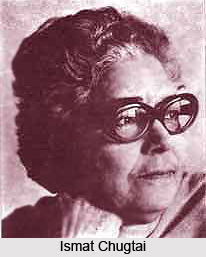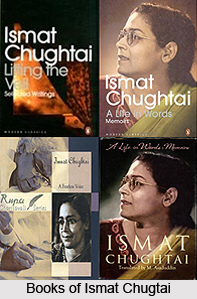 Born in Badaun, Ismat Chugtai was the only subversive Urdu woman to rank among the important figures of the 40s Urdu literary scene and of the erstwhile century. Her stories were inflammatory and her writing style branded as rebellious one the sub -altern representative of the marginalized Muslim sect. A time when resistance seemed to be the buzz word, Ismat Chughtai and Sadat hasan Manto left a seminal impact on the promethean minds at that genre that savored the same like a talisman.
Born in Badaun, Ismat Chugtai was the only subversive Urdu woman to rank among the important figures of the 40s Urdu literary scene and of the erstwhile century. Her stories were inflammatory and her writing style branded as rebellious one the sub -altern representative of the marginalized Muslim sect. A time when resistance seemed to be the buzz word, Ismat Chughtai and Sadat hasan Manto left a seminal impact on the promethean minds at that genre that savored the same like a talisman.
Married to producer Shaheed Latif, she was involved in some of his films, for example Ziddi (1948). The film was Dev Anand`s first success. Chugtai worked as scenarist and producer on a few of Latif`s films - Arzoo (1950), Darwaza (1954), Society (1955), and Sone Ki Chidiya (1958). Ismat dissects through the facades of the largely feudal society that she came from with the precision of a surgeon`s knife. Her screenplays and dialogues portray such. Also, she wrote for and co-directed Faraib (1953); directed the children`s film Jawaab Ayega (1968) and My Dreams (1975), a documentary. Chugtai wrote the dialogues for Junoon (1978), a Shyam Benegal film and for Barkha Bahar (1973) as well as for Mehfil (1978); the story for Garam Hawa (1973) - a major film set in the turbulence of the Partition of India.
Cast aside for her path-breaking Brain Childs, Ismat was castigated by many of her contemporaries and fellow writers as fahaash, or vulgar. Glued to unconventional modem; often challenging the laid set back notions, social and moral stereotypes, her pen rooted, blossomed in East, set in the middle class milieu and the characters pushed against convention. Outspoken as she was, her stories like Chauthi Ka Joda`, are replete with nostalgic overtones and provocative innuendos and an outsider`s approach that jolted the progressive minds and raised orthodox eyebrows shaking them from their complacency. One, Lihaaf (1942), led to an obscenity trial at Lahore. Lihaf or The Quilt measured such boldness, such a stand alone stance from the ordinary that the editor of the magazine contemplated that it was the male tongue!
 Her autobiographical novel "The Crooked Line" faced a wild gamut of ignominy and insult but Chughtai, the iconoclast she is, acknowledged the same and welcomed it as a part of her chosen territory. She fought these charges; rather twisted an association with birds of the same feather; the contemporary iconoclasts like Saadat Hasan Manto to add fuel to her creative venture. Attaining the stature of prominence, she was the notable figure of the Progressive Writers` Movement. Her memoirs, Kaghazi Hai Pairahan, first published in full in 1994, and now translated as A Life in Words, welcomes the solitary world of the tigress; chaotic tempestuous and unconventional life of the author who was reluctant to be bogged down by societal norms.
Her autobiographical novel "The Crooked Line" faced a wild gamut of ignominy and insult but Chughtai, the iconoclast she is, acknowledged the same and welcomed it as a part of her chosen territory. She fought these charges; rather twisted an association with birds of the same feather; the contemporary iconoclasts like Saadat Hasan Manto to add fuel to her creative venture. Attaining the stature of prominence, she was the notable figure of the Progressive Writers` Movement. Her memoirs, Kaghazi Hai Pairahan, first published in full in 1994, and now translated as A Life in Words, welcomes the solitary world of the tigress; chaotic tempestuous and unconventional life of the author who was reluctant to be bogged down by societal norms.
Ismat`s creations are acknowledged and recognised in the academia for their ethnographic representation of Muslim women and their complex social reality in twentieth century. Across the world, the globe, the barricades of gender stereotypes; women writers have used memoirs, rather than the ostentatious narratives of autobiography, to voice their experienced reality. The genre as a "female gendered act" that exposes the duplicity of patriarchy and the sub-human, subaltern status accorded to women in male dominated societies.
She was an iconoclast, an educationist, and an icon of women`s empowerment. But above everything else, she was a woman. She understood the complexities of a woman`s mind, their inhibitions, and also their secret desires. A born rebel as she uttered, "There`s something in me that militates against putting faith in anyone uncritically...One should first examine all points of disagreement before coming to a consensus."






